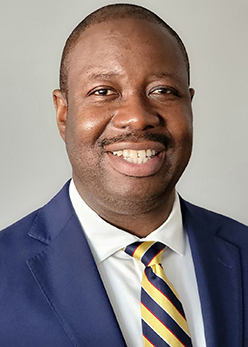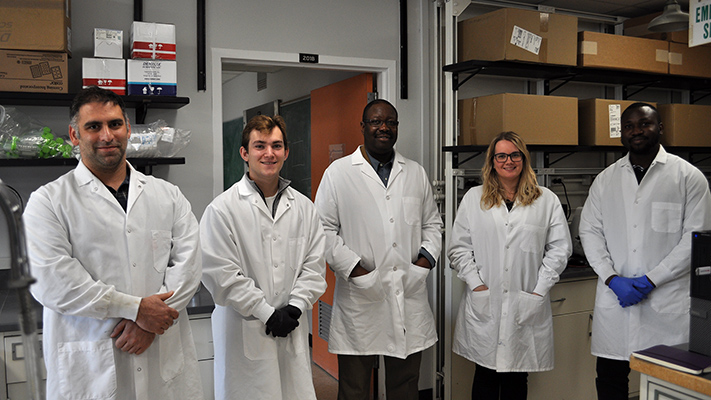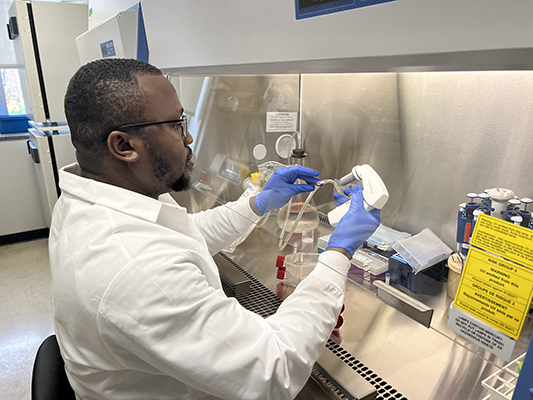MSU’s Olorunseun ‘Seun’ Ogunwobi selected as fellow of two prestigious academies
Article Highlights
- Michigan State University cancer researcher Olorunseun “Seun” Ogunwobi has been selected as a fellow of two prestigious research organizations.
- He was selected as a Jefferson Science Fellow of the National Academies of Sciences, Engineering and Medicine. In this role, he will be working with vast data sets to offer insights on the development of HIV surveillance strategies.
- Ogunwobi was also elected as a fellow of the Academy of Medicine Specialties of Nigeria, an organization committed to promoting excellence across all areas of medical research and education.
- Ogunwobi, who serves as chair of the Department of Biochemistry and Molecular Biology in MSU’s College of Natural Science, is renowned for his groundbreaking work on the progression of solid organ tumors and the impact of cancer health disparities.
Renowned Michigan State University cancer researcher Olorunseun “Seun” Ogunwobi is joining two communities of world-changing medical scientists.
Ogunwobi has been selected to serve as a Jefferson Science Fellow of the National Academies of Sciences, Engineering and Medicine. He has also been elected as a fellow of the Academy of Medicine Specialties of Nigeria.

Olorunseun is being recognized by both academies as a leading medical expert and outstanding scholar. As such, he will provide academic and professional leadership that influences and informs policy and enhances human health and welfare.
The Jefferson Science Fellowship provides an unparalleled opportunity for scientists to contribute their expertise to teams managing foreign policy and international development.
The Academy of Medicine Specialties of Nigeria is an honorific and policy research organization committed to promoting excellence across all areas of medical research and education.
“Recognition by these prestigious organizations is validation of Dr. Ogunwobi’s many contributions in science and medicine, particularly around health disparities," said Doug Gage, vice president for Research and Innovation. “The new experiences he will gain, and the knowledge he will share from the Jefferson Fellowship will benefit MSU’s long-standing international engagement to solve some of the world’s most pressing health challenges.”
Leveraging vast data sets to improve health
As a Jefferson Science Fellow, Ogunwobi will work with data gathered from the President’s Emergency Plan for AIDS Relief, or PEPFAR, in the Bureau for Global Health within the United States Agency for International Development, or USAID. Specifically, the bureau is in USAID’s Strategic Information, Evaluation and Informatics Division of the Office of HIV/AIDS.

Since its founding in 2003, PEPFAR has spearheaded global efforts to confront the HIV/AIDS epidemic, providing nearly $90 billion in treatment and policy development.
“We want to find out how we can best leverage these vast data sets,” Ogunwobi said. “We’ve accumulated so much information, but how can we use it to improve health outcomes? For example, can we accurately predict transmission hotspots, and if so, can we intervene to prevent problems from ever occurring?”
Ogunwobi will offer expert insight into HIV surveillance strategy development and the generation of methodology for the prediction of "transmission hot spots" using USAID resources, including artificial intelligence. He will also provide guidance on utilizing data to broaden generalizable knowledge and improve the quality of USAID programs.

Doctoral student Chinedum Udekwu conducting research in the Ogunwobi Laboratory. Ogunwobi will leverage his two recent fellowships to further critical work on solid organ tumors and the impact of cancer health disparities. Credit: Ogunwobi Laboratory.
Having access to immense quantities of government-sourced data is especially exciting given Ogunwobi’s ongoing research at MSU. Here, he’s leading groundbreaking work on the progression of solid organ tumors and the impact of cancer health disparities — factors such as race and gender that can greatly influence cancer diagnoses and treatments.
Although the data he’ll be working with is focused on HIV/AIDs, it will also provide a one-of-a-kind opportunity to ask novel questions about other health issues, including those related to his own cancer research interests.
For instance, given the scope of the data at hand, Ogunwobi will be able to look at disparities in health outcomes across diverse geographical areas and populations that might otherwise be difficult to address with smaller data sets. Furthermore, he’ll be able to examine the impact of HIV/AIDS and other diseases on cancer incidence and outcomes.
“It’s well known that HIV can lead to certain cancers,” Ogunwobi said. “For instance, many people also tend to be co-infected with human papilloma virus and hepatitis B, which are actually oncogenic viruses. So, there’s an inherent ability to ask cancer-related questions among this data, which is very exciting for us.”
‘Very close to home’
Coinciding with this next chapter of research, Ogunwobi was also elected as a Fellow of the Academy of Medicine Specialties of Nigeria. Membership in the Academy reflects outstanding professional achievement in the realm of human health and welfare, and extensive contributions to the science, theory and art of medicine.
“It means a great deal to become a fellow of the Academy of Medicine Specialties of Nigeria,” Ogunwobi said. “I completed my initial medical training in Nigeria, and to be recognized at the national level among so many brilliant medical specialists — it’s a kind of accomplishment that’s very close to home, and to where I began.”
As a dual fellow, Ogunwobi’s impactful presence at MSU continues to grow. In addition
to his roles as professor, department chair, lab leader and teacher, he will also
be co-director of the university’s new Center for Cancer Health Equity Research —
another step in a lifelong pursuit to solve cancer health disparities at the local
and global levels.
Banner image: MSU researcher Olorunseun 'Seun' Ogunwobi has been selected as a Jefferson Science Fellow of the National Academy of Sciences, Engineering and Medicines as well as a fellow of the Academy of Medicine Specialties of Nigeria. These appointments recognize and elevate Ogunwobi’s groundbreaking work on the molecular mechanisms of progression of solid organ tumors and the understudied impact of cancer health disparities. The image depicts cells in a culture illuminated by a microscope. Credit: Ogunwobi Laboratory